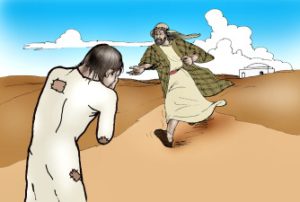 People run – they run toward or from something or some goal, they run for a cause like to be fit, they run by opportunities…
People run – they run toward or from something or some goal, they run for a cause like to be fit, they run by opportunities…
My good brother and believer in the Lord, Patrick Pitchappa, was a member of the Goldman Sachs Mixed running team that won the gold medal in the prestigious Puma Urban stampede event in August 2015. He was also named the running Ambassador in the 2012 Hyderabad Marathon. I asked him the question, “Why do you run?” and his response was in addition to the obvious physical health benefits, when he runs, he feels that it connects him closer to our Creator God. He quotes one verse after all his runs from Psalm 139:14 which states, “I praise you (God) because I am fearfully and wonderfully made; your works are wonderful, I know that full well.” In other words, Patrick was expressing that not only was he running to be physically fit, but more importantly to be spiritually fit, as well. Eric Liddell, Scottish missionary to China and winner of the 400 meters event in the 1924 Olympics in Paris, refused to run his more favored event of 100 meters because it was going to be on a Sabbath, choosing God over gold. As an heptathlon athlete, I ran during my high school years in several intra- and inter-school events, sprinting in individual events, winning the gold medal or in relay races with a team, enduring to win. I now run to be physically fit and for conditioning the body to be fit to do Shaolin Do Kung Fu with our beloved firstborn son, Reuben. So while there may be many reasons as to why people run, the fact of the matter is people run.
In the Bible, we see accounts of people running as well. The Father of the prodigal son ran toward his returning son (Luke 15:20). Elijah, God’s true prophet ran faster than king Ahab’s chariot (1 Kings 18:44-46) when God’s power came upon him. David ran toward the giant Goliath before winning the battle for Israel in the Name of the Lord (1 Samuel 17:48,51). Ahimaaz, the son of Zadok the high priest ran irrespective of what the outcome could be (2 Kings 18:19-28).
In the account of the eldest servant of Abraham, seeking a wife for Isaac, his the master’s son, we see that the servant ran to fulfill the master’s mission (Genesis 24:17), while Rebekah the wife-to-be ran to serve the servant (Genesis 24:18-20) and her brother Laban ran to invite the servant into their household (Genesis 24:29-30).
Cursorily it may seem that Laban the brother of Rebekah was an extremely hospitable man as was the custom of that day and age, however, with the Bible completely canonized by the Holy Spirit of God, with deeper scrutiny, we have more insights into Laban’s character. Laban beguiled his nephew Jacob by giving Leah his first daughter in marriage instead of Rachel the second daughter as promised (Genesis 29). Laban agreed quickly to Jacob’s proposal when he felt that it would be more favorable for him in the distribution of the sheeps and goats (Genesis 30-31). These accounts, in addition to the record that Laban ran after he saw the jewelry (earrings and bracelet) that the servant of Abraham had given to his sister Rebekah indicates that he was likely driven to run for selfish gain instead of a sense of serving or hospitality.
Points to ponder:
You and I may be running toward, or from, or for, something or someone. What are we running for? Are we running to fulfill our Master’s mission (John 13:13) i.e., God’s mission? Are we running to serve as people of God? or Are we running for personal gain? What is the reason for (your) running?
Genesis 24: 29-30 (KJV)
29 And Rebekah had a brother, and his name was Laban: and Laban ran out unto the man, unto the well.
30 And it came to pass, when he saw the earring and bracelets upon his sister’s hands, and when he heard the words of Rebekah his sister, saying, Thus spake the man unto me; that he came unto the man; and, behold, he stood by the camels at the well.
Hebrews 12:1-2 (KJV)
1 Wherefore seeing we also are compassed about with so great a cloud of witnesses, let us lay aside every weight, and the sin which doth so easily beset us, and let us run with patience the race that is set before us,
2 Looking unto Jesus the author and finisher of our faith; who for the joy that was set before him endured the cross, despising the shame, and is set down at the right hand of the throne of God.


